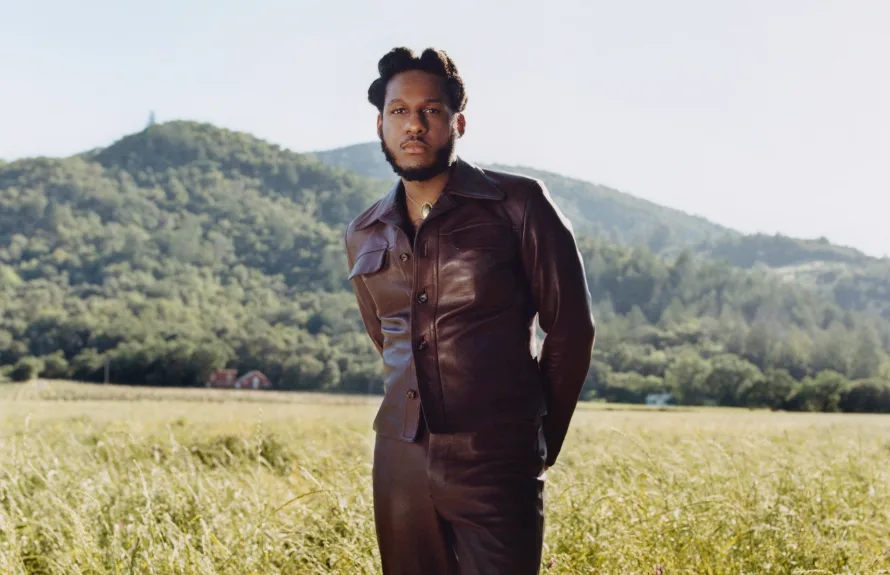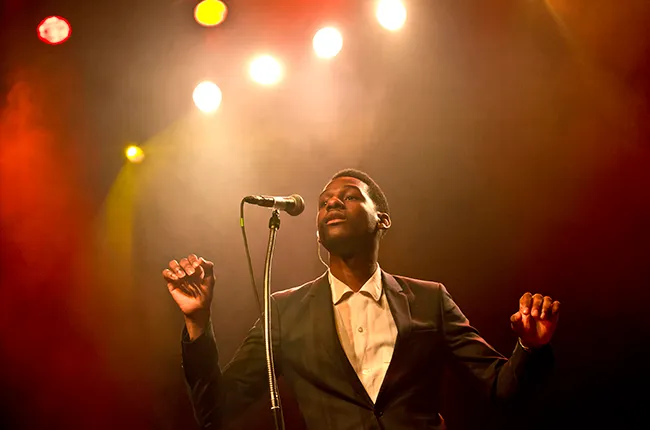Leon Bridges: The Soulful Voice of Modern R&B

Tired of music that feels like it’s missing something? You’re not the only one searching for songs with heart. Leon Bridges brings a sound that’s warm, real, and rooted in soul, yet it fits right into today’s world. His voice carries the weight of old-school R&B but feels fresh and alive.
This article takes you through Leon’s life, from his Texas roots to his rise as a music star. We’ll cover his early days, his breakout album, how his sound grew, his standout style, and why he’s shaping modern R&B. If you love music with soul or just want to know more, this is for you.
Early Life and Musical Roots
Leon’s music comes from where he started. His childhood and early influences built the foundation for his soulful sound. Let’s look at how it all began.
Growing Up in Fort Worth
Leon Bridges, born Todd Michael Bridges in 1989, started life in Atlanta, Georgia, but moved to Fort Worth, Texas, when he was little. His single mom raised him in a home full of faith, where gospel music was a constant. He worked as a dishwasher to help out, never imagining he’d one day play sold-out shows. Those early years gave his music its honest, grounded feel.
Gospel and Soul at Home
Music was always around Leon. His mom loved singers like Whitney Houston and Sade, while his dad played Sam Cooke and Bobby Womack. Church hymns sank deep into him, too. As a teenager, he got into ‘90s R&B, listening to groups like Jodeci. Those sounds classic soul and smoother modern beats mixed together to shape his style.
Finding His Voice
Leon didn’t start out singing. In high school, he was a dancer, copying moves from music videos. But in his late teens, he picked up a guitar and started writing songs. He played at small Fort Worth venues, trying out his own tunes. “I wanted to sing something real,” he told a music magazine. Those open mic nights helped him discover his love for soul.
Breakthrough with ‘Coming Home’
In 2015, Leon’s first album, Coming Home, hit the scene like a warm summer breeze. It brought back the sound of ‘60s soul and made him a star. Here’s how it went down.
How the Album Came to Be
Leon got noticed playing local shows in Fort Worth. Two guys from a band called White Denim heard him and loved his throwback style. They recorded Coming Home in a basic studio, using old equipment to get that classic sound. Leon shared some songs online, and one, “Coming Home,” started getting radio play. By the end of 2014, he signed with Columbia Records, and things took off.
Critics Fell for the Retro Sound
When Coming Home dropped, it climbed to number six on the Billboard 200 and later went platinum. People heard Sam Cooke and Marvin Gaye in Leon’s smooth, heartfelt singing. Songs like River and Lisa Sawyer told stories of faith and family. He played big gigs, like at the White House, and got a Grammy nomination for River as Best Music Video in 2016.
Charts and Growing Fame
The album topped the R&B/Hip-Hop chart and connected with fans everywhere. Tracks like Smooth Sailin’ had a lively vibe, while River felt deep and personal. Leon’s knack for honest storytelling made him stand out. He showed the world that modern soul could feel old-school yet new.
Evolving Sound and Later Albums
Leon didn’t stay in one lane. His later music brought in new sounds while keeping his soulful heart. Let’s see how he changed things up.

Read also: Why Tyler Childers Brings Real Heart to Country Music
Mixing It Up with ‘Good Thing’
In 2018, Leon dropped Good Thing, his second album. It wasn’t just soul—it had funk, jazz, and ‘90s R&B vibes. Working with a new producer, he made songs like “Bad Bad News,” which had a danceable groove. Another track, “Bet Ain’t Worth The Hand,” won a Grammy for Best Traditional R&B Performance. “I didn’t want to repeat myself,” Leon said in an interview. The album reached number three on the Billboard 200.
Teaming Up with Others
Leon worked with all kinds of artists. He did a song with Odesza that had an electronic feel, joined Macklemore for a track called “Kevin,” and made an EP, Texas Sun, with the band Khruangbin, blending soul with funky grooves. These projects brought his music to new fans, from pop lovers to hip-hop heads.
Getting Deeper with Words and Music
By 2021, Leon’s third album, Gold-Diggers Sound, showed a new side. Recorded in a Los Angeles hotel, songs like “Motorbike” and “Why Don’t You Touch Me” talked about love and heartbreak with raw feeling. He mixed in blues and even a bit of country. “This is my truth,” he told a radio station. The album got another Grammy nod for its depth.
Style and Stage Presence
Leon’s not just about the music his look and live shows make him unforgettable. Here’s what makes his vibe so special.
Old-School Style with a Twist
Leon’s outfits could be from a ‘50s movie think sharp suits and classic shoes. His style caught the eye of his first producers when they saw him outside a bar. He takes inspiration from old soul singers but adds his own modern spin. Fans and fashion magazines call him a trendsetter for mixing retro and now.
Owning the Stage
Leon’s concerts are electric. At places like Austin City Limits, he sings with passion and moves like a born performer. “I feed off the crowd,” he once said in an interview. Whether it’s a small club or a huge festival, he makes every fan feel like he’s singing to them. That connection is what keeps people hooked.
Inspiring Other Artists
Leon’s paved the way for singers like Anderson East and Black Pumas, who mix soul with new sounds. His success shows you can honor the past while doing something fresh. He’s helped bring back modern soul in a big way, giving other artists room to shine.
Legacy and Cultural Impact
Leon Bridges isn’t just making songs he’s building a legacy. His music connects old and new, and his influence keeps growing. Let’s look at why he matters.

Soul for Today’s Listeners
Leon’s music makes young people love soul. His 2024 album, Leon, mixes ‘90s R&B with Texas roots, feeling personal yet universal. “I’m singing my life, but it’s for you, too,” he said in a recent interview. His songs let fans see their own stories in his words.
Awards and Big Wins
Leon’s got three Grammy nominations and a win in 2019 for “Bet Ain’t Worth The Hand.” His albums keep hitting the Billboard Top 10, and he’s played for huge crowds, even for former President Obama. Those moments show how much people love his work.
Shaping the R&B Revival
When Coming Home came out, it helped start a wave of new soul music. Leon’s shown that R&B can mix old vibes with new ideas. Music writers say he’s breaking down barriers, making modern R&B more open and creative for everyone.
Conclusion: Why Leon Bridges Matters
Leon Bridges is a one-of-a-kind artist. From a dishwasher in Fort Worth to a soul star, his journey is about heart and hard work. His music, style, and realness make him a leader in modern R&B.
What’s your favorite Leon Bridges tune? Share it in the comments! Want more soul music? Check out our guide on the history of soul music to keep exploring.
FAQs: People Also Ask
What’s Leon Bridges’ music style?
Leon mixes classic soul, modern R&B, gospel, and bits of jazz, funk, and country. His early songs feel like ‘60s soul, but his later work adds today’s sounds.
How did Leon Bridges get famous?
He got noticed at Fort Worth open mics by musicians from White Denim. His online songs went viral, landing him a deal with Columbia Records in 2014.
What are Leon Bridges’ biggest songs?
Hits include “Coming Home,” “River,” “Bad Bad News,” and the Grammy-winning “Bet Ain’t Worth The Hand.”
Is Leon Bridges still making music?
Yes! His 2024 album Leon mixes soul, blues, and R&B, showing he’s still creating and growing.






